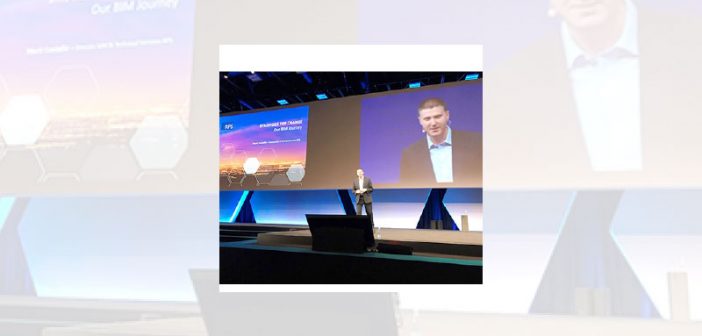Our CitA Board Member interviewee Mark Costello, RPS Director of Digital Design, BIM & Technical Services tells Irish building magazine how innovation is driving change in construction.
Mark Costello has over twenty-five years’ experience delivering large infrastructural projects at all stages. At an industry level Mark is currently managing the digital design and delivery of major roads, water, pharmaceutical, healthcare and education projects.
Founded in 1970, RPS is a leading global professional services firm. RPS define, design and manage projects that create shared value by solving problems that matter to a complex, urbanising and resource-scarce world. In Ireland, RPS have delivered many of the largest infrastructural, commercial and industrial projects over the last 40 years from initial conception through to completion and ongoing operations.
Mark creates opportunities for design teams, enabling them to influence “What they deliver, how they deliver, embracing digital working and best available technologies across all projects.” He delivers value for money for clients by promoting a culture which ensures best practice, responsibility, accountability and effective communication, and ensures high quality systems, resources and training infrastructure are identified and implemented.
Mark was awarded BRE Academy Fellowship in 2017 and is the director responsible for achieving BIM Level 2 Business Systems Certification for RPS in 2015 and the new ISO 19650 (organisation and digitisation of information) Certification in 2019.
RPS and Innovation
In 2009/2010 RPS identified BIM as a key industry development. Mark led the development of a working paper, established a BIM Committee and piloted BIM within RPS. He has been instrumental in providing a new award-winning approach to BIM education and training in Ireland and the UK and collaborated with local academic institutions to develop a BIM programme specifically designed to support evolving BIM technologies in a parallel BIM design process. Mark is an active member of the Continuing Professional Development (CPD) steering group in RPS assigned responsibility to deliver the objectives set out in the Knowledge Management Strategy.
Mark was nominated for the ‘Innovator of the Year’ award at the global Architecture, Engineering & Construction (AEC) Excellence Awards in the USA in 2018. The AEC Excellence Awards showcases global projects that have embraced Connected BIM and emerging technologies like generative design and industrialised construction. Debuting in 2018, the new ‘Innovator of the Year’ award recognises a person who is transforming the design and construction industry using technology, collaboration, evangelism, and innovation. “These finalists represent how the AEC industry is not only embracing the future of making but are making it happen now,” said Nicolas Mangon, Vice President AEC Business Strategy and Marketing at Autodesk.
Mark tells us about achieving BIM Level 2 Business Systems certification from BRE and ISO 19650 certification. “Our Galway office was initially awarded BIM Level 2 Business Systems Certification by BRE Global in November 2015, followed by Dublin, Cork and Newark (UK) offices in May 2018. We are delighted to have achieved the ISO 19650 certification in 2019 in recognition of our best practice in BIM. Replacing the BIM Level 2 Business Systems Certification, ISO 19650 is an international standard for managing information over the whole life cycle of a built asset, using BIM. Updating our digital technology skills is a continuous journey. We have already met our accreditation target which now allows us to provide best service for our clients and solve complex problems efficiently,” says Mark.
The construction industry operates in an extremely competitive marketplace, having to continuously innovate and become more efficient. Over recent years, the use of digital technologies (BIM, data analytics, GIS, LIDAR, etc.) in design, construction and operational phases of projects has increased. On large scale infrastructural projects, specific 3D modelling requirements are becoming commonplace. To deliver in 3D, there is a significant step change in service delivery to a collaborative environment, required from all design professionals, contractors and operators involved. “For all project participants to work in an integrated collaborative way and deliver on time to realistic project budgets there must be a consistency of approach across all phases of the project. A national BIM mandate and digitisation within the industry will help drive this forward,” Mark says.
Major Projects
Mark was Project Director with RPS for an innovative BIM approach on the M8 motorway improvements scheme in Scotland, with project partners Ferrovial Agromam AMEY. This project was worth £415m with RPS part of the multinational consortium (Ferrovial/Lagan/Amey/RPS) collectively responsible for the design, construction, commissioning, operation and maintenance of the project on behalf of the Scottish Roads Partnership.
Early commitment to engage and set behaviours for proactive collaboration between all stakeholders enabled the integrated approach, managed and steered through the ‘M8 BIM Committee’ comprising RPS, AMEY and Ferrovial Lagan JV. “We shared and managed the BIM model using the standards set out in the BIM Execution Plan (BEP) for data collection and analysis, data exchange formats, roles and responsibilities, the volume strategy and the required deliverables. The BEP was produced in collaboration with all parties.”
Testament to the innovative application of BIM Level 2, Mark received a special commendation for his work on the M8 project at the CitA Irish BIM Innovation Awards 2016 and this project became a Pathfinder Project for the definition of the Scottish BIM mandate in 2017.
Since 2019, Mark is Director of Digital Design responsible for the development and delivery of a digital twin design model of the I-10 from I-45 to I-610 West Loop in Houston Texas. The project length is 7 miles, and the estimated construction cost is $5.5bn. “A major element of the project is a public outreach effort to engage and educate the community about the project. RPS are developing a realistic 3D model of the proposed alternative solutions that will allow stakeholders to immerse themselves in a Virtual Reality experience to visualise the very complex elements of this project.”
Marks team have also created a Virtual Consultation Planning Room in light of recent COVID-19 restrictions which will go live to the general public in Q1 2021. “This will enable RPS to engage and connect with the community by simulating the public consultation experience. It allows our audience to access proposals, interact with visualisations, share their comments and dive into detail – all in their own time and in the comfort of their own home.”
“RPS have invested significantly in modern workplace technology over recent years, to ensure we have the tools and infrastructure to facilitate remote working and are well placed to deal with disruptive events like the current virus outbreak.”
Challenges
Today technology plays a huge part in change management, but it cannot do it by itself, collaborative company-wide initiatives need to be implemented in order to succeed Mark says. “RPS has a history of utilising the latest technological advances to further our success and competitiveness. The implementation of BIM has been a driving force in RPS’ success over recent years. In the extremely competitive market in which we work it is imperative that we acquire new skills in order to survive. In a rapidly changing industry with government mandates fast approaching, we didn’t wait. We recognised the need for a significant step change in our approach to learning and training in order to win new work. We needed to implement a company-wide commitment to change organisational structure, corporate culture, and IT systems. BIM and digital technologies needed to be the new way of working and it was perceived to be too great a change.”
Technological changes are a constant threat and embracing new technologies ahead of the competition requires adaptability Mark says. “Technology can be a driver for change and having everyone on the same page is of vital importance. When we recognised the need to develop a strategy to progress BIM in our company, we invested in technology and staff CPD that would allow us to deliver in this new environment.”
GMIT
Asked about the GMIT Higher Diploma in Engineering in BIM and RPS’ involvement in the course development since 2012, Mark says: “At the time no flexible BIM programme was available to meet our business needs, the solution was an industry-academia collaboration that improved our staff skills that was required for this step change. We worked with GMIT to develop structures and resources to assist our staff and allow us to deliver our projects through BIM. We developed a BIM programme with GMIT in specifically designed and relevant modules to support evolving BIM technologies (Federated Models / AR & VR Technologies / Point Cloud Data / Common Data Environments) in a parallel BIM design process. Delivery of this course commenced on a pilot basis in September 2013 and it has culminated in the multi-award winning (industry/academia collaboration) and formally accredited Higher Diploma in Engineering in BIM (Level 8).”
Mark was appointed Adjunct Lecturer in GMIT in recognition of his work, expertise, dedication to education and his passion for delivering large scale infrastructural projects in a new collaborative environment.
Marks experience has influenced his approach to more recent projects he tells us, “For all parties to achieve collective business benefits and deliver best value to the client, everyone needs to be fully engaged in the project information management process, have the capability to undertake their respective responsibilities and demonstrate appropriate collaborative behaviours. Investing significant resources to support our clients, partners and suppliers on their digital transformation journey is part of our ethos in RPS.”
“Extending the use of digital processes from the design stage through the construction phase, creating lifecycle engagement and enriching the models with data make the models a core tool for future maintenance and operation. This in turn is creating a requirement for skilled and competent users of the technologies in client organisations if they are to realise the full benefits of digital delivery.”
Education and Training
The higher education sector in Ireland has responded well to the BIM transition, albeit still within the limitations of disciplinary boundaries in the main. Marks says, “There remains a clear opportunity for all higher education institutions in Ireland to come together to develop a national BIM educational framework that will inform a holistic embedded approach across all disciplines.”
Commenting on Ireland’s digital education being recognised abroad Mark tells us, “Ireland is seen as a leader in the adoption of new International BIM and digital standards. Building capacity in digital construction is facilitating Irish design team participation and leadership in infrastructure projects across the world.”
Marks believes to work in a data driven, high technology environment, “We must develop new skills that will enable teams to work in the complex world of 3D modelling. This includes not only technical skills but also behavioural change from a conflictual approach to a collaborative approach. Behavioural change is a pre-requisite if the benefits of technology and other industry advances are to be realised. Such training is now becoming available to the wider industry through new courses and programmes in third level colleges and industry led initiatives such as the CitA programme with Enterprise Ireland and IDA support.”
RPS awarded Epic MegaGrant
First launched in 2019, Epic MegaGrants is a $100m programme that continues Epic Games’ long-standing commitment to projects they find inspiring and beneficial for their community. On winning the MegaGrant Mark said: “The aim of our study is to build the capability and knowledge required to create open world environments for live infrastructural projects for use during the planning, design and construction phases. This project study will enable the public, design teams and clients to engage with our designs in a completely innovative new way says Mark.”
CitA
Mark has been appointed to the Board of Construction IT Alliance (CitA), as a non-executive Director to further promote its vision of harnessing the potential of ICT in the Irish construction industry. CitA are a not-for-profit organisation that focuses on the promotion of Digital Construction in Ireland. The majority of digital transformations fail (up to 84% according to Forbes) and more often than not, the issues are related to people – typically hinging on a failure to communicate the vision or empower individuals to transform the organisation from the inside. “CitA have been instrumental over many years bringing companies together and sharing best practice in relation to the ever-changing international BIM standards,” he says.
Working with CitA to bring the very successful International CitA BIM Gathering to Galway in 2019 was a particular highlight for Mark, “The event focused on Delivering Better Outcomes for Construction and the effort made to bring this renowned international event to Galway signalled a welcome change in supporting a balanced regional approach across Ireland. Gerry Carty MD of RPS UK & Ireland gave the keynote opening address on our journey in BIM and the important role Ireland has to support the ongoing digital transformation in the construction industry.”
Mark tells us he is very fortunate to have the support of his family, colleagues and friends over many years to encourage him to pursue his passion for CPD and new collaborative working practices. Mark is currently completing an MA in Teaching and Learning and is co-author of several academic papers published in peer reviewed international journals and a new book due for publication in Q1 2021.
Reflecting, Mark says, “Adapting BIM has been a huge success for RPS and has enabled us to win and deliver exciting new projects and in new markets internationally – exciting times ahead!.”
CitA Update
CitA continues to attract interest in its services. Dr Alan Hore explains: “We were a little concerned about our members and how they were coping at this time, but we have been pleased to see that the work of CitA remains relevant to the sector and, if anything digital adoption has accelerated during the pandemic and CitA are benefitting as a consequence through our training and interests in our event programme.”
Dr Hore tells us, “This year we are collaborating with the Chartered Institute of Building (CIOB), Galway-Mayo Institute of Technology (GMIT) and the Irish Green Building Council (IGBC) on a new 10 part Aistriú: Circular Economy series. We are also delighted to have secured another round of Skillnet Ireland funding. I think CitA may have one of the longest established Skillnet networks in Ireland today.”
CitA will continue with its Tech Trend series this year focusing on the ‘Top 10 Technologies’ that will transform the construction industry. The series will commence on 18 February with ‘Cloud Based Construction Management’. CitA will also continue with its Regional events series in March and November.
Dr Hore concluded that “2021 will see the return of the CitA BIM Gathering between 20-24 September. Due to the continued presence of COVID-19 the event will be hosted virtually.”




